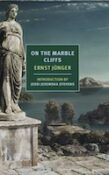 The Book Beat reading group selection for July is On the Marble Cliffs by Ernst Jünger. We will meet virtually online via Zoom on Wednesday, July 31 at 7:00 pm. The Zoom link will be sent on the afternoon of the meeting to anyone interested in attending. Please call or Email bookbeatorders@gmail.com to sign up.
The Book Beat reading group selection for July is On the Marble Cliffs by Ernst Jünger. We will meet virtually online via Zoom on Wednesday, July 31 at 7:00 pm. The Zoom link will be sent on the afternoon of the meeting to anyone interested in attending. Please call or Email bookbeatorders@gmail.com to sign up.
The Book Beat reading group features international works in translation, and discussions are free and open to the public. Please call (248) 968-1190 for more information.
Now in a new translation, an imaginative, darkly radiant fable about a pair of brothers, formerly warriors, whose idyll is shattered by an encroaching fascistic force.
Set in a world of its own, Ernst Jünger’s On the Marble Cliffs is both a mesmerizing work of fantasy and an allegory of the advent of fascism. The narrator of the book and his brother, Otho, live in an ancient house carved out of the great marble cliffs that overlook the Marina, a great and beautiful lake that is surrounded by a peaceable land of ancient cities and temples and flourishing vineyards. To the north of the cliffs are the grasslands of the Campagna, occupied by herders. North of that, the great forest begins. There the brutal Head Forester rules, abetted by the warrior bands of the Mauretanians.
The brothers have seen all too much of war. Their youth was consumed in fighting. Now they have resolved to live quietly, studying botany, adding to their herbarium, consulting the books in their library, involving themselves in the timeless pursuit of knowledge. However, rumors of dark deeds begin to reach them in their sanctuary. Agents of the Head Forester are infiltrating the peaceful provinces he views with contempt, while peace itself, it seems, may only be a mask for heedlessness.
Tess Lewis’s new translation of Jünger’s sinister fable of 1939 brings out all of this legendary book’s dark luster.
“On the Marble Cliffs [is] a parable of ascendant barbarism that contains an oblique protest against Nazism…[In] On the Marble Cliffs, Jünger attempted something riskier: a dark fable with unmistakable modern overtones.” –Alex Ross, The New Yorker
“The classical beauty of the writing, in Tess Lewis’s exquisite translation, gives a sense of the author’s sympathies. . . . [H]is short, prismatic book is beautiful.” –Sam Sacks, The Wall Street Journal

Ernst Jünger (1895-1998) was a German philosopher, writer, and entomologist who became widely known for Storm of Steel, his memoir of World War I. He was the author of six novels, including The Glass Bees (available from NYRB Classics), and dozens of works of philosophy. During his lifetime, he received the Goethe Prize as well as the Grand Cross of the Order of Merit of the Federal Republic of Germany.
